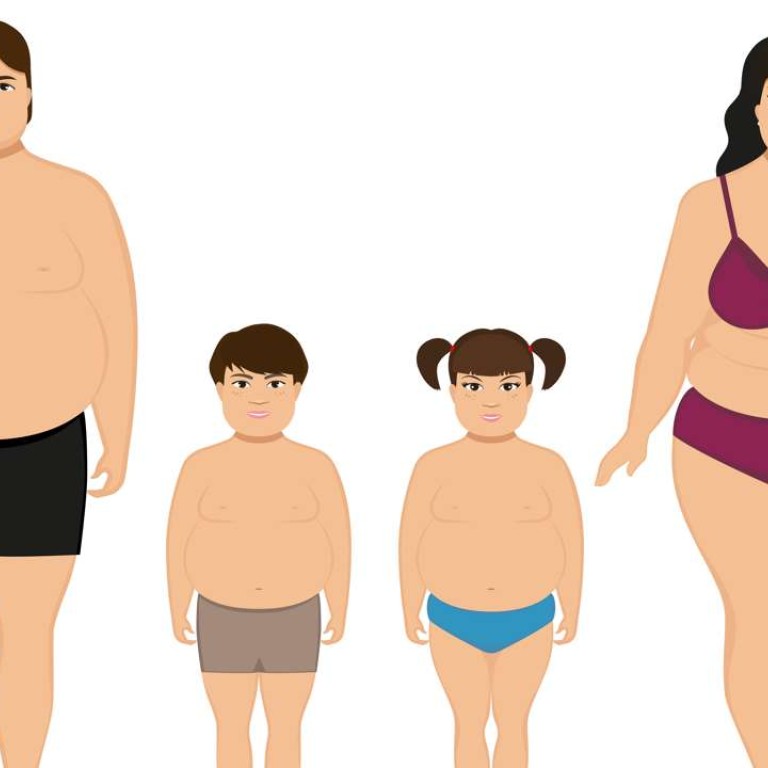
Children of obese parents more likely to be clumsy, not good with people and have trouble solving problems in early life, study finds
Fine motor skills and social competence compromised in children of obese parents, and doctors don’t know why. Also in health news: artists’ brush strokes may be window to degenerative brain disorders
Being obese could have far-reaching effects beyond one’s own body: children of obese parents may be at risk for developmental delays, according to a new study by researchers at the US National Institutes of Health.
The researchers found that children of obese mothers were more likely to fail tests of fine motor skill – which is the ability to control movement of small muscles, such as those in the fingers and hands. Children of obese fathers were more likely to fail measures of social competence, and those born to extremely obese couples also were more likely to fail tests of problem-solving ability.
The study, published in the journal Pediatrics, included data from more than 5,000 women who gave birth in New York state (excluding New York city) between 2008 and 2010. The women’s children were tested on their development at four months of age and retested six more times through to the age of three.

Compared to children of normal weight mothers, children of obese mothers were nearly 70 per cent more likely to have failed the test indicator on fine motor skill by the age of three. Children of obese fathers were 75 per cent more likely to fail the test’s personal-social domain – an indicator of how well they were able to relate to and interact with others by the age of three. Children with two obese parents were nearly three times more likely to fail the test’s problem solving section by the age of three.
The exact reason is not known why parental obesity might increase children’s risk for developmental delay, but the researchers note that animal studies indicate that obesity during pregnancy may promote inflammation, which could affect the fetal brain.

Inactivity in obese mice linked to a decreased motivation to move
Struggling to stick with your exercise programme? A new study done in mice provides clues to the reason why: scientists have found that in obese mice, physical inactivity results from altered receptors of dopamine – a hormone critical for movement – rather than excess body weight.
In the study that appears in the journal Cell Metabolism, mice were fed either a standard or a high-fat diet for 18 weeks. At the start of the second week, the mice on the unhealthy diet had higher body weight. By the fourth week, these mice spent less time moving and got around much more slowly when they did move. Surprisingly, the mice on a high-fat diet moved less before they gained the majority of the weight, suggesting that the excess weight alone was not responsible for the reduced movements.
The investigators looked at six different components in the dopamine signalling pathway and found that the obese, inactive mice had deficits in the D2 dopamine receptor. They also studied the connection between inactivity and weight gain, to determine if it was causative. By studying lean mice that were engineered to have the same defect in the D2 receptor, they found that those mice did not gain weight more readily on a high-fat diet, despite their lack of activity, suggesting that weight gain was compounded once the mice start moving less.

Can brush strokes help identify Alzheimer’s and Parkinson’s in people who paint?
It may be possible to detect neurodegenerative disorders in artists before they are diagnosed, according to a University of Liverpool study that appears in Neuropsychology. Researchers examined 2,092 paintings from the careers of seven famous artists who experienced both normal ageing and neurodegenerative disorders.
Of the seven, two had suffered from Parkinson’s disease (Salvador Dali and Norval Morrisseau), two had suffered from Alzheimer’s disease (James Brooks and Willem de Kooning) and three had no recorded neurodegenerative disorders (Marc Chagall, Pablo Picasso and Claude Monet).
The brush strokes of each of the paintings were analysed using a method known as “fractal” analysis to identify complex geometric patterns. Although painters work within a different style or genre, the fractal dimension in which they operate should remain comparable.
The study showed clear patterns of change in the fractal dimension of the paintings differentiated artists who suffered neurological deterioration from those who aged normally. Researcher and psychologist Dr Alex Forsythe said: “We hope that our innovation may open up new research directions that will help to diagnose neurological disease in the early stages.”

